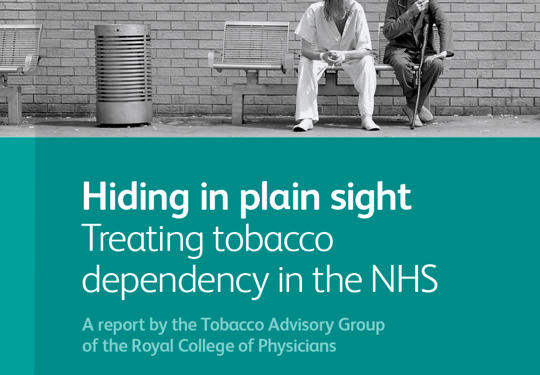Hiding in plain sight: Treating tobacco dependency in the NHS addresses the harms and costs arising from smoking in the patients we see every day, and argues for a new approach to treating their addiction.
We argue that responsibility for treating smokers lies with the clinician who sees them, and that our NHS should be delivering default, opt-out, systematic interventions for all smokers at the point of service contact.
Summary
- The principle of autonomy requires that patients who smoke and who are in contact with health services have their smoking ascertained, and information and treatment offered, to enable autonomous decisions on future smoking.
- The principle of justice requires that we offer smokers help to quit smoking; failure to so implies that smokers’ health is less important than that of other patients.
- Failing to provide help to quit smoking while delivering other similarly or less cost-effective interventions to smokers represents distributive injustice which both perpetuates and exacerbates health inequalities. > Opt-out models of treatment help to sustain autonomy and justice in treating smoking, and should be the norm.
- It is at least as important to address smoking in patients using secondary care as those in primary care. Treating the physical health of patients is also no less important than treating mental health.
- Treating smoking improves both.
- Since most people would prefer to avoid being ill than to go through illness and treatment, prevention should be given a proper place in the allocation of health service resources.
- Proper use of health service resources also requires that more cost-effective treatments are used in preference to less cost-effective treatments.
- Smoke-free NHS estates protect the health of patients and staff, signals that smoking is a crucial health issue, and supports smokers who are trying to quit.
- Heath service commissioners and practitioners have a responsibility to ensure that cost-effective smoking interventions are provided and properly implemented. Failure to identify and treat smokers is no less negligent than failure to identify and treat patients with cancer. Systems failure is no less negligent in this respect than individual failure.
- Smoking cessation should be incorporated, as a priority, as a systematic and opt-out component of all NHS services as a complement to local authority services, and delivered in smoke-free settings. It is unethical to do otherwise.
Conclusion
Hiding in plain sight: Treating tobacco dependency in the NHS demonstrates that clinicians working in almost all areas of medicine will see their patient’s problems improved by quitting smoking, and that systematic intervention is a cost-effective means of both improving health and reducing demand on NHS services. Smoking cessation is not just about prevention. For many diseases, smoking cessation represents effective treatment.
It calls on doctors to recognise that recognising and treating tobacco dependence as their business, and to incorporate smoking cessation as a systematic and opt-out component of all NHS services, delivered in smoke-free settings.
Note: On 10 August 2020, Table 2.6 (continued) on page 38 was amended to correct the figures for the rows relating to ‘Abdominal aortic aneurysm.’





